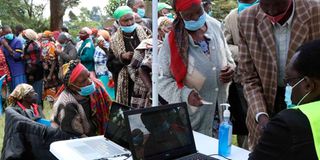End of universal health pilot project leaves Nyeri residents exposed

Nyeri residents queue during the NHIF biometric registration at Wamagana grounds on June 2, 2021. The end of the pilot UHC programme in Nyeri has left residents struggling to pay for basic medical services.
The end of the pilot Universal Health Coverage (UHC) programme in Nyeri has left residents struggling to pay for basic medical services, Governor Mutahi Kahiga said on Wednesday.
The project, which offered free medical services in public hospitals, ended last November, meaning patients must now pay for services as the county reintroduced charges in health facilities.
Speaking during a mass UHC-NHIF biometric registration, the governor said the government-sponsored programme disrupted NHIF uptake, which dwindled by 20 per cent.
The numbers dropped as residents began to assume that there would be free treatment into the future, he said.
“Had we known what we know now, we would have opted not to be a pilot county because it really messed us up in terms of data,” he said.
Nyeri was among four counties selected to pilot the programme due to its high disease burden of non-communicable diseases alongside Machakos, Kisumu and Isiolo.
Free treatment
Under the UHC pilot project, patients received treatment free of charge as the government sought to alleviate the healthcare burden among residents.
Nyeri has registered over 715,000 members in the programme.
“We must say as a county we have learnt our lessons which spurred the need for us to make life-changing decisions because we have a sick population,” he said.
The county leads in lifestyle diseases such as cancer, hypertension and diabetes.
Data collated from the health department in 2018 indicated that the prevalence of diabetes in Nyeri was estimated at 6.4 per cent, which was triple the national rate, and hypertension at eight per cent. Some 700 new cancer cases are recorded daily at Nyeri Referral Hospital.
Surge in numbers
Governor Kahiga said that during the pilot phase, there was a surge in the number of people seeking free medical services, which indicated that many were suffering but could not afford treatment.
He said the county has introduced the Health Fund Bill that is meant to help it run a robust health system and ensure that hospitals do not run out of crucial drugs for patients suffering from hypertension and diabetes.
Meanwhile, the government plans to enrol about 3.5 million vulnerable people across the country in the National Health Insurance Fund (NHIF) in the next financial year.
The number of beneficiaries in each county will be based on the poverty index as per the 2019 census.
“This means 20 per cent of the identified poor households per county in the first phase,” Mr Washington Okoth, a director at the insurer.
Biometric registration
The mass biometric registration targets four categories of people: the vulnerable, who have been identified by the county governments; members already enrolled in NHIF; those not enrolled; and members who are dependent on those already registered.
Nyeri County is seeking to register between 60,000 and 100,000 people.
“We are calling on all Kenyans to register with NHIF and pay for their insurance cover,” he noted.





